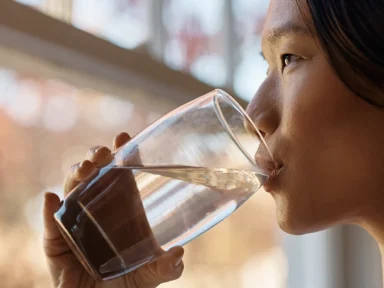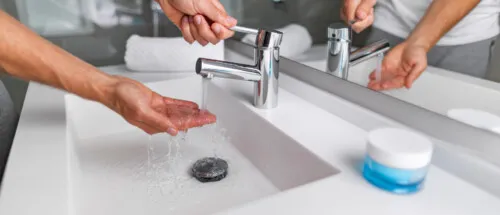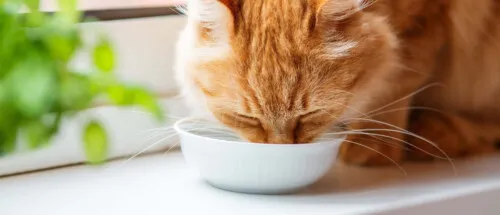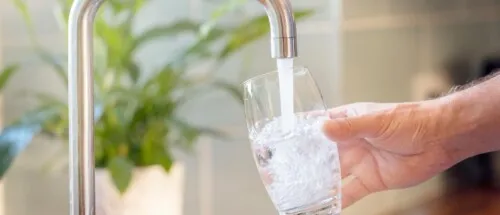How minerals and health affect the taste of water
People have a lot of opinions about tap water — a sweet taste typically isn’t one of them. It isn’t every day that you encounter sweet-tasting water from a faucet, which makes it all the more unusual. If your tap water has a sweet taste, it could be for several reasons, so don’t reach for a water filter replacement just yet. Learn why your water tastes sweet, from potential water contaminants to underlying health issues.
In this article:
- Hard Minerals
- Lead
- Limescale
- Iron
- Chlorine
- Medications
- Health Issues
- Oral Hygiene
- Plumbing
- How to Address Sweet Tasting Water
- When Water Tastes Different, Take Note
- Frequently Asked Questions
1. Hard Minerals
One of the common causes for making water taste sweet is hard minerals. While not harmful to the human body, certain minerals like calcium and magnesium can alter the pH of the water. If a high concentration of these pH-altering minerals is behind the taste, you’re still drinking clean water, it’s just more mineralized.
If the cause for your water sweetness is hard minerals, you can easily get rid of them by utilizing a water softener. Water softeners remove minerals like calcium and magnesium, so your water will return to its typical pH levels.
2. Lead
An issue particularly in homes with older pipes, lead can also make your water taste sweet. Water with low pH can be lead-contaminated. Unlike hard minerals, lead can be extremely dangerous to the human body leading to brain, soft tissue, and organ damage. That’s why it’s important to know that sweet-tasting water can be a telltale water contamination symptom.
Luckily, tests can be done to check your water for contamination – including lead. Testing is crucial to ensuring the safety of your water.
3. Limescale
Just like calcium and magnesium, limescale (or calcium carbonate) is a mineral deposit that can cause water to taste sweet. Limescale isn’t harmful to you — it is the chalky buildup you see in coffee makers or tea kettles if you have hard water. The presence of limescale in your water could indicate a buildup in your pipes which you can easily get rid of with at-home lime treatments.
4. Iron
Iron is a tricky culprit because it can taste different to different people. Some say that the presence of iron in their water makes it taste sweet while others are left with a more metallic taste in their mouth. Either way, iron in water isn’t inherently harmful to your health. We consume foods with iron in them all the time, though our bodies can’t process it as well from water, according to the Minnesota Department of Health.
5. Chlorine
When you’re drinking city water, it goes through highly regulated disinfection cycles. One of the most common disinfectants out there for water is chlorine. That’s right! It’s not just for keeping pools squeaky clean; it’s good for drinking water, too. That residual chlorination can cause water to taste sweet.
Per the Centers for Disease Control and Prevention (CDC), chlorine is safe to drink as long as it does not exceed 4 mg per liter. You can easily test the chlorine levels in your tap water using a handy water test kit, just as you would for a swimming pool or hot tub.
5. Medications
Medications can cause all kinds of taste-related side effects. If you’re on a new medication and your water suddenly tastes sweet, that could be the reason. It’s common for things like antibiotics, allergy medications, and even blood pressure pills to trigger that type of reaction.
6. Health Issues
Aside from medications, sometimes underlying health issues can cause water to taste sweet. If water tests are coming up blank, you may want to reach out to a doctor for a more concrete answer to your concerns.
Acid Reflux
When dealing with acid reflux, you may experience water tasting sweet. That’s because the stomach acid coming up is causing your taste buds to perceive sweetness because of excess saliva. The same phenomenon happens after vomiting.
Diabetes
One of the more common underlying conditions to consider is diabetes. Water may taste sweet if your body is trying to regulate your blood sugar levels. A higher sugar level may cause water to taste sweet to you.
Hormone Imbalance
Hormone imbalances can also make water taste sweet. Similarly to diabetes, a hormone imbalance can make water taste sweet but also cause other things like fatigue and weight gain.
Infections
When our bodies are fighting infections, especially those in the nose/throat region, it can change your taste perception. These infections can also alter your sense of smell. If you have a cold or a sinus infection, your body may start creating saliva with more glucose which causes the sweet taste — not the water.
Lung Cancer
It is uncommon, but lung cancer can trigger water to taste sweet. This side effect condition is known as dysgeusia which can happen in a range of cancers; however, lung cancer can trigger the syndrome of inappropriate antidiuretic hormone secretion (SIADH) that can make things taste sweet.
7. Oral Hygiene
If you’ve ever chewed mint gum and tried to drink water, you know how quickly our mouths adapt to a certain flavor. Sometimes elements of our oral hygiene routines can alter the way water tastes. Things like toothpaste, mouthwash, and gum can create tastes that stay in our mouths when we’re done using them, which can cause water to taste sweet — or even very cold.
8. Plumbing
We already know that limescale buildup in your pipes can cause water to taste sweet. However, other plumbing system issues like bacteria buildup or copper pipes can do the same thing. Sometimes all you need to do is flush your pipe system to get things to taste normal again.
How to Address Sweet Tasting Water
Even if the cause of your sweet water isn’t harmful, it is good to know what exactly is causing the change. There are a few ways you can do this and fix any underlying system, contaminant, or mineral problem.
Test Your Water
Home water testing is vital, especially if things start tasting funky or different. There are ways to test your water yourself but the best way is by contacting a professional who can pinpoint issues you may have missed. Best of all, once you know the root cause of the problem, your trusted professional can work with you to create problem-solving water solutions.
Flush Your Pipes
This is a simple process. Flushing your pipes means running all the water in your home uninterrupted to flush out the impurities, sediments, and buildups. You can do this by turning on all of your hot water fixtures (like sinks) and letting the water run for 15 minutes or so before shutting them off.
Source of Water
If your home runs on city water, you may want to contact your local water company. When your water starts tasting different, if nothing has changed or tests come up negative, it’s a good idea to get in touch with them to see if they’ve adjusted something or if it’s a larger issue.
Water Filtration and Softener System
We’ve already mentioned how water softeners can remove those sweet-taste-causing mineral buildups, but other filtration systems can also help improve the taste of your home’s water. From whole-home custom water filtration systems to cutting-edge reverse osmosis systems, there are a range of possibilities for healthy and hydrated homes.
When Water Tastes Different, Take Note
There are a lot of reasons why your water suddenly tastes sweet. Some have innocuous natural mineral content and others are more concerning health issues. No matter what, you want to take note of the change to get it figured out. It’s always better to be safe than sorry.
Conducting water tests is an easy way to put your mind at ease. To get the fullest picture of your home’s water quality, it’s best to contact a professional to get you the answers you’re looking for. When you’re ready to get to the bottom of the sweet-tasting water mystery, contact LeafHome to schedule a water test.
Frequently Asked Questions (FAQs)
Why does water taste sweet when you’re dehydrated?
When you’re dehydrated, you’re more likely to perceive water as being sweet. That sensation, in this case, is caused by your stomach acid. You’re also more likely to crave sweets when you’re dehydrated, so drinking water is even more satisfying to a dehydrated body.
Is it safe to drink water that tastes sweet?
For the most part, yes. Most underlying causes (outside of health-related ones) are harmless mineral build-ups like limescale, calcium, and magnesium. The one type of sweet-tasting water that is not safe to drink is lead-contaminated water.
Why does my tap water taste metallic?
If your water suddenly tastes metallic, it’s most likely caused by high levels of iron. Having iron in your water is not harmful, though some may not like the metal taste. It is possible to have metallic water contaminated by lead, however. So it is a good idea to get a water test anytime there is a significant change in the taste of your home’s water.
Can a change in water tasting sweeter indicate a health issue?
Yes. Certain medical conditions like sinus infections, diabetes, and even acid reflux can cause water to taste sweet.



